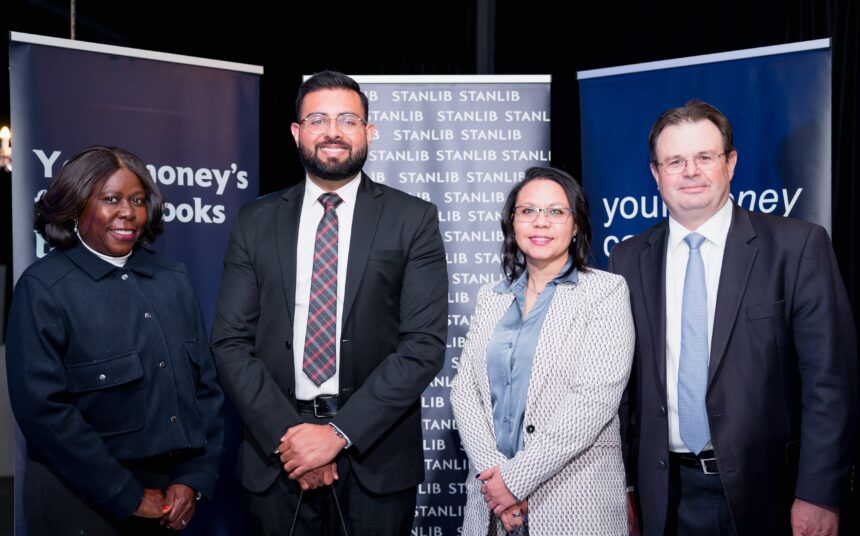Stanlib Namibia last week hosted their annual STANLIB Namibia InPerspective Roadshow, where a team of experts unpacked key investing themes and their implications for economies around the globe.
They also explained the long-term perspective for investments, and discussed portfolio construction.
Kevin Lings, Stanlib chief economist, gave a macro-economic update.
He highlighted some facts about world consumer inflation, which was making progress and edging closer to target levels.
“Inflation worldwide is mostly under control, and 38 countries worldwide have cut interest rates. South Africa and Namibia are sure to follow. We anticipate around September this year. Europe is aiming for an inflation target of 2%, while the United States is standing at just over 3% with a target of 2%. South Africa will also look at a decent interest rate cut – not massive, and we expect the SA repo rate will end up around 7% within 18 months”.
Lings stated that Stanlib monitored 80 central banks worldwide, none of whom had increased interest rates in the last month.
“This is a good sign, as economic growth seems to be at a decent pace worldwide. And while the world’s largest economy, the United States’ economy is growing, offering just over eight million jobs, the United States is still hugely indebted, and the next president needs to address this before it becomes an even greater burden.”
Turning to South Africa, Lings elaborated on the South African government’s debt, which stood at 75% of GDP, with no significant enhancement of infrastructure (rails, ports and Eskom) in sight.
“Mostly, the money has been misappropriated, mismanaged and looted, and SA’s 2023 ranking on the world corruption perception index was the highest ever – 83 out of 180 countries, up from 72 in 2022. It is therefore no wonder that corporates and investors have lost faith in the South African government. SA corporates – one of the least-indebted corporates in the world – have 1.2 trillion Rand in bank accounts, but are reluctant to invest or spend, as confidence and trust in the government needs to be rebuilt before they spend or invest their money.”
Lings emphasised the need to partner with the private sector to grow the economy, highlighting several positive developments in South Africa.
This included deregulation of South Africa’s energy sector, allowing private companies to invest as well as non-political appointments at key SOEs.
In February 2024, the government announced the permanent appointment of Michelle Phillips as Transnet Group CEO.
Sasol and TFR announced a first-of-its-kind public private partnership to improve rail transport reliability.
Transnet completed its financial due diligence on International Container Terminal Services (ICTSI), a Philippines-based port operator, in connection with the DCT Pier 2 transaction.
Furthermore, Transnet released a draft version of its Network Statement for public comment.
“There is more optimism in South Africa – and once we rebuild the infrastructure, the growth rate will be lifted and, hopefully, foreign investment will return.”
Regarding Namibia, Lings suggested the government should also start looking at private/public partnerships.
“We are not, for example, saying sell TransNamib – we are saying keep the asset, but get someone private to manage it to such an extent that it becomes profitable, employs more Namibians, and is a win-win for all. This could be done for the railways, hospitals and possibly even schools in Namibia.”
Sade Gertze, Stanlib Namibia’s portfolio manager, covered the Namibian economic update, and shared that developments in the oil, gas and green hydrogen industries have already had a big impact on the local economy.
“This is only the beginning, and we anticipate the sector to be pivotal to Namibia’s long-term growth story, with positive spillover effects into other sectors, creating more broad-based economic growth.”
She added that inflation has been well-contained over the last few months, and the probability of an interest rate cut this year is increasing.
Gertze also showcased the Standard Bank NamibiaFlexible Income Fund, a product that was introduced by Stanlib last year.
“As we move from this prolonged high interest rate environment, market dynamics change and optimal portfolio positioning changes with it. This new product is designed to respond to market changes nimbly and efficiently, consistently producing inflation beating returns. It delivers bond-like returns, with less volatility and with capital protection. We do the asset allocation, so you don’t have to.”



